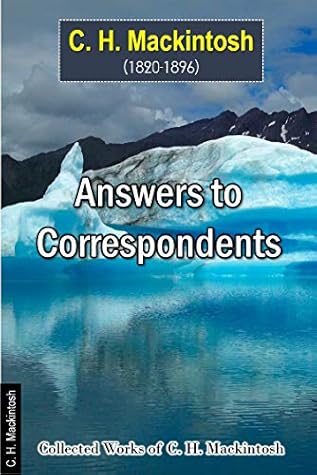Answers to Correspondents (Collection of Writings by Charles Henry Mackintosh Book 6)
by C.H. Mackintosh
Charles Henry Mackintosh (1820-1896) was a nineteenth-century Christian preacher, dispensationalist, writer of Bible commentaries, magazine editor and member of the Plymouth Brethren. Mackintosh's literary fame rests primarily upon his work: “Notes on the Pentateuch”, beginning with a volume of 334 pages on Genesis, and concluding with a two-volume work on Deuteronomy extending to over 800 pages. His books have been translated into a dozen or more languages. Brethren historian Roy Coad notes:
"Another popular writer among the exclusives was an Irish schoolmaster, Charles Henry Mackintosh, who preached extensively in the revival movement. The initials 'C.H.M.' became familiar in many pious evangelical households of the later Victorian and Edwardian years. No critical scholar, Mackintosh nevertheless had a marked gift for simple Biblical exposition, and his works on the Pentateuch had an enormous vogue as simple aids to devotional interpretation for the first five books of the Bible".
The works Mackintosh are characterized by a deep-toned evangelical spirit and the enjoyment of the God's Word.
"Another popular writer among the exclusives was an Irish schoolmaster, Charles Henry Mackintosh, who preached extensively in the revival movement. The initials 'C.H.M.' became familiar in many pious evangelical households of the later Victorian and Edwardian years. No critical scholar, Mackintosh nevertheless had a marked gift for simple Biblical exposition, and his works on the Pentateuch had an enormous vogue as simple aids to devotional interpretation for the first five books of the Bible".
The works Mackintosh are characterized by a deep-toned evangelical spirit and the enjoyment of the God's Word.
BUY NOW
Kindle Edition, 132 pages
Published April 21st 2019
© 2025 Bibleportal.com 版权所有.

Charles Henry Mackintosh (1820-1896) was an Irish preacher, Bible expositor, and author. Active in the Irish Revival of 1859-1860. His first tract, in 1843, was "The Peace of God," and his last, shortly before his death in 1896, was "The God of Peace." Generally known as C.H.M., was one of the gifted writers of the Plymouth Brethren, so-called.
He was schoolmaster at Westport, County Mayo, Ireland, for a few years. But for the greater part of his life he devoted himself to evangelism and pastoral ministry as well as to religious journalism, as editor of the monthly periodical Things New and Old; and to religious literature. He was the author of the Notes by C. H. M, on all the books of the Pentateuch, which enjoyed great popularity, being sold in enormous quantity, especially in the United States.
... Show more